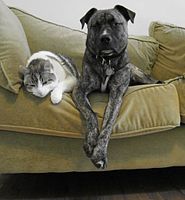
Photo from wikipedia
Abstract This scientific opinion of the EFSA Panel on Food Contact Materials, Enzymes, Flavourings and Processing Aids (CEF Panel) deals with the safety assessment of the Linpac recycling process (EU… Click to show full abstract
Abstract This scientific opinion of the EFSA Panel on Food Contact Materials, Enzymes, Flavourings and Processing Aids (CEF Panel) deals with the safety assessment of the Linpac recycling process (EU register number RECYC0148), which is based on the Linpac super clean technology. The input to this process is hot washed and dried poly(ethylene terephthalate) (PET) flakes originating from collected post‐consumer PET containers, containing no more than 5% PET from non‐food consumer applications. In this technology post‐consumer washed and dried PET flakes are heated in continuous driers under gas flow before being extruded. Having examined the results of the challenge test provided, the Panel concluded that the decontamination in the driers (steps 2 and 3) are the critical steps that determine the decontamination efficiency of the process. The operating parameters controlling its performance are well defined and are residence time, ‘air flow per mass of flakes’ and temperature in the driers. It was demonstrated that, depending on the operating conditions, the recycling process under evaluation is able to ensure that the level of migration of potential unknown contaminants into food is below a conservatively modelled migration of 0.15 μg/kg food, derived from the exposure scenario for toddlers. The Panel concluded that recycled PET obtained from the process is not of safety concern when used at up to 100% to make articles intended for contact with all types of foodstuffs, except packaged water. These articles should be used at conditions covered by migration testing of 10 days at 20°C. The articles are not intended to be used, and should not be used, in microwave and conventional ovens.
Journal Title: EFSA Journal
Year Published: 2018
Link to full text (if available)
Share on Social Media: Sign Up to like & get
recommendations!